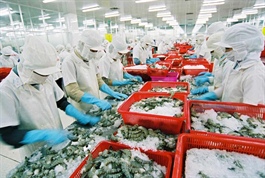Vietnamese goods dominate domestic market
Vietnamese goods dominate domestic market
More and more city residents are accepting the message to give priority to Vietnamese goods, which dominate sales at supermarket systems now, a senior official says.

Nguyen Ho Hai, deputy secretary of the HCM City Party Committee and head of the “Vietnamese people give priority to using Vietnamese goods” campaign’s steering committee, said this at a review conference held last week.
He said that amidst the harsh impacts of the COVID-19 pandemic, the city had made efforts last year to stabilise the market and strengthen links with provinces and cities across the country to have reputed, quality Vietnamese goods reach consumers.
Association of the campaign with the city’s 2021-2022 market stabilisation programme in 2021-2022 helped balance supply and demand and contributed to boosting the profile of Vietnamese goods, he said.
The city also implemented trade promotion activities effectively, thereby expanding the distribution network of locally-made products and promoting consumption of agricultural products that faced export difficulties as a result of the pandemic, he added.
Hai asserted that the campaign has significantly oriented consumption habits towards Vietnamese goods.
Distribution domination
Domestically produced goods account for 80-90 per cent of goods sold in supermarket systems compared to 60-70 per cent 5-10 years ago, the conference heard.
Nguyen Thi Bich Van, head of communications at Central Retail Vietnam, said the percentage of Vietnamese products in its retail system (including GO!, Big C and Tops Market supermarket chains) was above 90 per cent.
The retailer has consistently implemented "the livelihood for the community" and other programmes that support signature products of villages, communes and localities to meet standard requirements so that they can enter its retail chains, she said.
Similarly, Le Truong Son, deputy general director of Saigon Co.op, said the percentage of Vietnamese goods in its retail systems, including Co.opmart, Co.opXtra, Co.op Food, and others, has been maintained at over 90 per cent for many years.
Hai said that given unpredictable developments in the world and the country this year, State agencies at all levels should strengthen their roles in promoting the campaign.
Trade promotion programmes need to become more diverse to further enhance business-to-business and business-to-customer connections, foster links between distributors and producers, and between the city and other localities to ensure stable supply chains, he added.
Ly Kim Chi, chairwoman of the Food and Foodstuff Association of HCM City, suggested that to improve the campaign’s efficiency, the city should step up dissemination and make it more regular instead of doing it at specific times in a year.
To encourage more local consumers to opt for Vietnamese goods, businesses need to further improve product design and quality up to international standards, achieving equality between the quality of good produced for export and domestic consumption, other speakers said at the conference.
Businesses must continuously innovate to adapt to consumer habits, they added.
The conference honoured several collectives and individuals for their active contribution to the campaign.





















